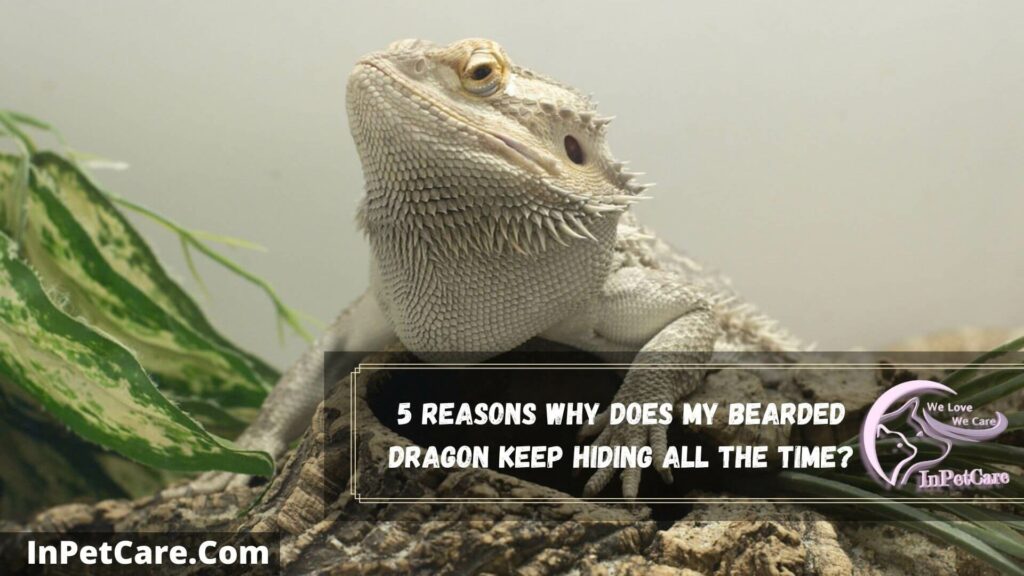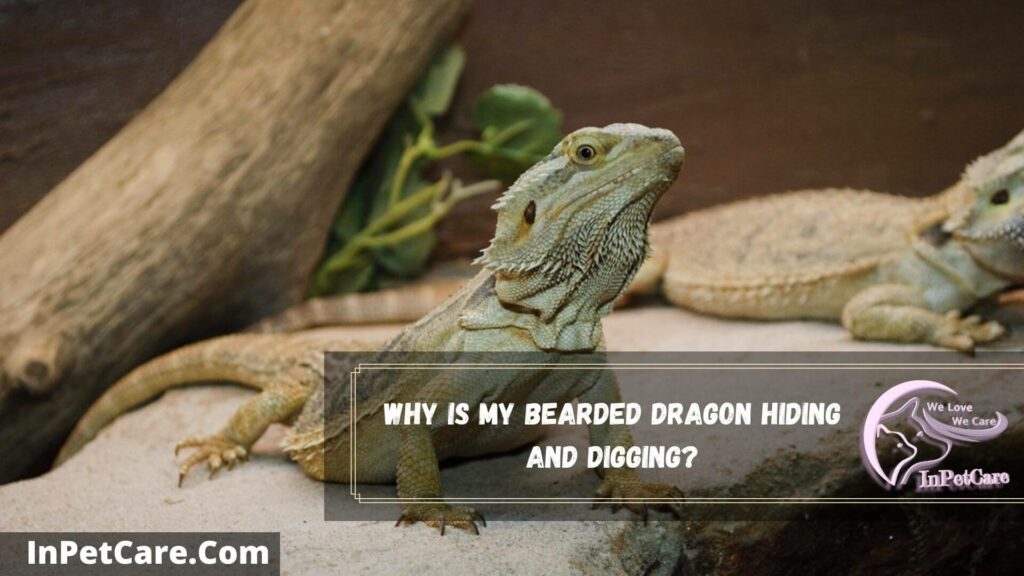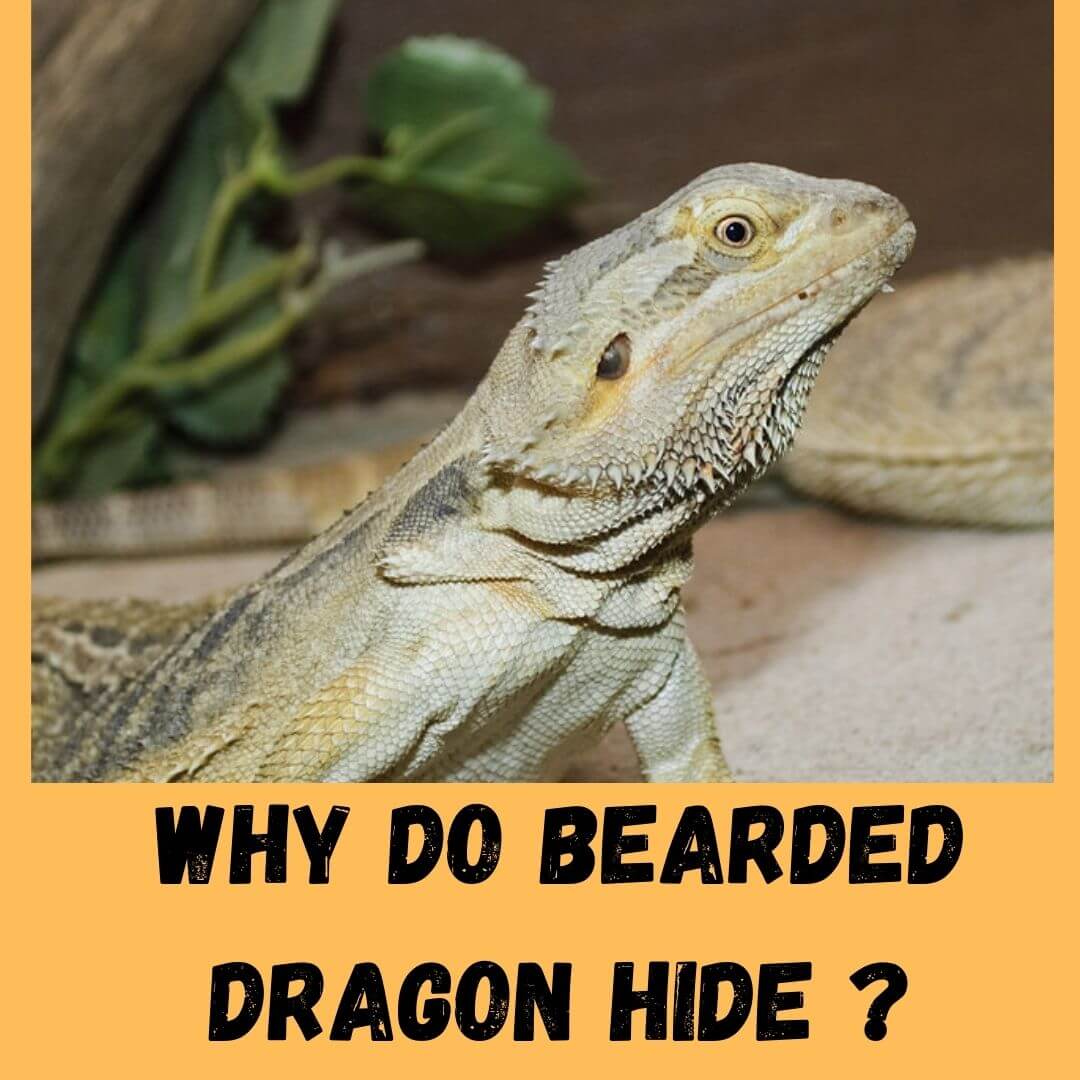We all know bearded Dragons are very gentle, curious, and social reptiles. They all enjoy and can tolerate being around us. Since they are sociable and tolerant of humans, why does my bearded dragon keep hiding?
In this article, I will give you a list of reasons why is my bearded dragon hiding all the time & how do I get my Bearded Dragon out of hiding? If you’re in hurry, below is a quick answer.
Why Does My Bearded Dragon Keep Hiding All The Time? A Bearded Dragon can keep hiding out for many reasons. The possible cause of a bearded dragon to hide could be a bright and intense light. A new bearded Dragon may also conceal if they are unfamiliar with the habitat and the environment. An anxious and stressed-out beardie may also look to hide under a rock or a log.
Post Contents
5 Reasons Why Does My Bearded Dragon Keep Hiding All The Time?

Your Beardie Is Sick
If your bearded dragon feels sick, it’ll exhibit signs like rejecting foods, acting sluggish, parasite infection, and lethargic. A sick bearded Dragon will also hide a lot.
To know what’s wrong with your Bearded Dragon, you will need to look at their movements, expression, and symptoms. Observe Your Dragon closely to find out if they are sick or not for an hour or 2.
You should also look over their poop to check if there is any parasite in it. Sometimes, ill beardie poop can also smell bad. Bearded Dragons suffering from lethargy will have bone deformities. Lethargic beardie will always look to avoid walking.
Your Bearded Dragon mostly gets sick by lack of nutrients in the diet or required UVB. A bearded dragon suffering from a parasite infection will have smelly, runny poop. If you happen to find any blood in it, then consider getting them to the nearest veterinarian as soon as possible.
Your Beardie Is Stressed Out
If your bearded dragon is feeling stress, it is natural for them to hide in a corner, looking vulnerable. Bright light or Sharing its habitat with another mate can lead them towards hiding under a log or rock. If they’re kept in poor care or habitat, they will likely experience health issues. Check if they’re healthy or not.
If they are acting normal, then maybe the health issues aren’t stressing them out. Loud noises from tv, speakers, or machine are also provoking to them. If you have placed their habitat in such a place where loud music or TV is present, then it’s annoying & stressful for reptiles, and it could be the primary reason why my beardie is hiding a lot.
A bearded Dragon can also feel stress when you bring them home first. Other than that, banging on the glass or approaching the dragon when they are new, still adjusting themselves to the environment, can lead them to hide out and feel stressed.
Your Beardie Is Hiding From High Intensity/Bright/Intense Light
Be sure to check the lighting setup of your bearded dragon. A bearded dragon can hide at night due to the increment of humidity as well. If you suspect any problem with the installed UVB light, consider turning it off for 1 or 2 days. It will help you check if it makes any difference in your dragon behavior or not.
Light is crucial for the dragon. It helps them to stay active and healthy. Wrong bulbs or lighting setup can be harmful and stressful for them. Besides that, bearded Dragons can also start squinting because of bright light.
Avoid using overly bright light around their enclosure. I prefer using bright white bulbs like halogen flood but not those soft white bulbs. Soft white bulbs sometimes tend to be too high or bright for some setups depending on the tank size and the habitat’s room. At night, you should never use any colored bulb in the room or the tank.
Installing colored bulbs (like black, yellow, red) can distract your beardie sleep cycle. If your dragon is not getting enough sleep, then they can also try hiding out during the day and try resting. If the UVB Light you have installed is too strong or doesn’t distribute evenly, get it removed.
Too strong or light will also hurt your dragon eyes and make them hide. I recommend UVB tube light as a better solution, but it’s not usable for tanks smaller than 25 gallons. I would suggest you always position the light correctly overhead. You should place the light around 7 to 8 inches from above to prevent any pinching of your dragon eyes.
Your Beardie Is Preparing For Brumation
Bearded dragon tends to be very sensitive to changes around them. Any change around or inside the tank, even the slightest one, can make a huge difference in how your Bearded Dragon reacts and moves.
Even though you keep the temperature and humidity level stable and constant throughout the year, it is common for reptiles like bearded Dragons to hide in the winter season. They are so sensitive to changes around their environment; they can detect and feel even a slight change in the temperature and the daylight cycle.
I recommend you reduce the number of Daylight in the winter season by a couple of hours. A bearded dragon that starts brumation or preparing for it will hide and sleep a lot.
Even a slight change in the temperature or the daylight cycle during mid-late autumn can cause your bearded dragon to start brumating. It will generally last for a few months.
During brumation, the bearded dragon doesn’t fully sleep. You’re most likely to find them hiding, laying down, or sleeping maximum numbers of time. If these signs are noticeable in your Beardie behavior or movement, I recommend you avoid feeding food. Just offering a little food and water will do the work.
If your bearded dragon is in brumation, consider bathing them at least once a week and keep their tank clean. When they consider starting to brumate, the ideal age for bearded Dragons is around 12 months to 18 months.
Your Beardie Is Too Hot
At night temperature usually drops, and humidity rises. Sometimes, bearded Dragon humidity can go up 70 at night. If the temperature inside the tank is too high, it can make your beardie hide and stay away from the heat.
If you notice your bearded Dragon hiding to the cooler end of the tank while escaping from the hotter end, this could be why the bearded dragon is hiding a lot.
If you notice such behavior of not going back to the hotter end and basking again, try dropping the temperature. The ideal temperature is between 75 to 85 degrees Fahrenheit during the day and 70 to 74 degrees Fahrenheit at night. Plus, always check the devices and the thermometer installed for an accurate reading.
Sometimes, readings from stick-on thermometers tend to give an inaccurate reading, so you shouldn’t rely entirely on it. Nowadays, thermometers are available in different types. I would recommend you get a digital thermometer with probes.
It will help you fix the thermometer in a specific spot where you can quickly check the temperature. Always get 2. Install one in the hotter end, the other one in the cooler end of the tank.
For a more accurate and better understanding of the readings, consider using a handheld thermometer on top of it to check the temperature of any spot where you point it. It is recommended to stand only 2 inches away from the area to measure the temperature.
Why Is My Bearded Dragon Hiding And Digging?

The only reason why a bearded dragon could try hiding and digging is to get relaxed. If the temperature is too high or the basking light is too bright, then it could lead your bearded dragon to hide and dig at the same time. Hiding and digging behavior in a bearded dragon mostly exhibit the body being too hot.
Why Is My Bearded Dragon Hiding And Not Eating?
Poor light setup or brumating can discourage your beardie from eating and encourage you to hide. In most cases, brumation tends to be the primary reason a bearded dragon looks to hide out and avoid eating.
Brumation is a period of pseudo hibernation where bearded Dragon Aged between 12 months to 18 months spend a more extended period resting, sleeping, hiding, and eating. Bearded dragons usually brumate when the temperature drops or due to scarcity of food or water.
Do Bearded Dragons Hide When They Shed?
The shedding process can be very discomforting and stressful For Your Bearded Dragon at a certain level. It is usual for them to hide when they shed their skin. A beardie hides when they shed, exhibiting other behaviors like not eating much, acting sluggish & being lethargic.
The shedding process usually lasts for a few days and will settle down on its own as it finishes. As soon as the shedding process settles down, your bearded dragon will come out of hiding for sure. Just make sure to keep the temperature, humidity, and the environment around them stable & constant throughout the year.
Why Is My Baby Bearded Dragon Hiding?
If your bearded dragon babies are a few weeks old, it is customary to hide as they are not so familiar with the environment/habitat. Besides, feeding them insects larger in size can also stress them out to hide. In most cases, newly adopted Baby bearded dragons hide when they are relocated.
Conclusion
Bearded Dragons hiding, acting sluggish, being lethargic, resting a lot, and just staying still is expected behavior when the temperature changes. If it lasted for 1 or 2 days, it’s not concerning. They could be hiding out due to loud external music or sudden temperature change.
If any of this behavior continues for more than a week, observing your beardie behavior, movements, and actions will help you know the reason why they are hiding so much. I hope I managed to enlighten you on why does my bearded dragon keeps hiding all the time. Follow us on social media

94% of pet owners say their animal pal makes them smile more than once a day. In 2007, I realized that I was made for saving Animals. My father is a Vet, and I think every pet deserves one. I started this blog, “InPetCare”, in 2019 with my father to enlighten a wider audience.
